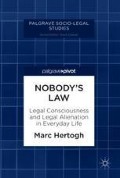Abstract
The first case study examines how a school director, the general public and legal professionals in the Netherlands move away from non-discrimination law. The chapter focuses on a ruling by the Equal Treatment Commission, which stated that a public school was wrong to suspend a female Muslim teacher who refused to shake hands with men. The chapter argues that the public controversy following this decision illustrates the way in which non-discrimination law matters in the Netherlands. The empirical research shows that the school director and many other ordinary people feel disconnected from non-discrimination law. Most people in this case study are ‘cynics’ and ‘outsiders’, with some signs of ‘legal meaninglessness’ and ‘legal powerlessness’ but with a strong sense of ‘legal cynicism’ and ‘legal value isolation’.
Access this chapter
Tax calculation will be finalised at checkout
Purchases are for personal use only
Notes
- 1.
The reconstruction of this case is largely based on open sources, including media reports, newspaper interviews and public rulings and reports from the Commission (on file). All quotations were translated from Dutch into English by the author.
- 2.
Since 2009, the Equal Treatment Commission is part of the Netherlands Institute for Human Rights.
- 3.
The numbers after each citation refer to the pages in the research report (Hertogh and Zoontjens 2006). All quotations were translated from Dutch into English by the author.
References
Alberts, J. (2008, September 20). Gelijke klachten. NRC Handelsblad.
Algemeen Dagblad. (2006, September 8). Docente Weigert Man Hand. Algemeen Dagblad.
Banakar, R. (2004). When Do Rights Matter? A Case Study of the Right to Equal Treatment in Sweden. In S. Halliday & P. Schmidt (Eds.), Human Rights Brought Home: Socio-legal Perspectives of Human Rights in the National Context (pp. 165–184). Oxford: Hart Publishing.
Bennington, L., & Wein, R. (2000). Anti-discrimination Legislation in Australia: Fair, Effective, Efficient or Irrelevant? International Journal of Manpower, 21(1), 21–33.
Bouma, J. (2007, July 17). Hoofddoek mag, handenschudden moet. NRC Handelsblad.
CGB. (2006). Jaarverslag. Utrecht: Commissie Gelijke Behandeling.
De Hoog, M. (2006, November 9). Handen geven is de kern van de samenleving. de Volkskrant.
Dierx, J., & Rodrigues, P. (2003). The Dutch Equal Treatment Act in Theory and Practice. European Roma Rights Centre (ERRC). Available at: http://www.errc.org/article/the-dutch-equal-treatment-act-in-theory-and-practice/1400.
Doorduyn, Y. (2006, November 9). Politiek wijst uitspraak handen schudden eensgezind af. de Volkskrant.
Ewick, P., & Silbey, S. (1992). Conformity, Contestation, and Resistance: An Account of Legal Consciousness. New England Law Review, 26(3), 731–749.
Ewick, P., & Silbey, S. (1998). The Common Place of Law: Stories from Everyday Life. Chicago: University of Chicago Press.
Eyer, K. R. (2011). That’s not Discrimination: American Beliefs and the Limits of Anti-discrimination Law. Minn. L. Rev., 96, 1275.
Goldschmidt, J., & Goncalves Ho Kang You, L. (1997). Enforcement of Equal Treatment: The Role of the Equal Treatment Commission in the Netherlands. In M. McEwen (Ed.), Anti-discrimination Law Enforcement: A Comparative Perspective (pp. 141–154). Aldershot: Avebury.
Havinga, T. (2002). The Effects and Limits of Anti-discrimination Law in the Netherlands. International Journal of the Sociology of Law, 30(1), 75–90.
Hertogh, M. (2004). A “European” Conception of Legal Consciousness: Rediscovering Eugen Ehrlich. Journal of Law and Society, 31(4), 457–481.
Hertogh, M. (2009). What’s in a Handshake? Legal Equality and Legal Consciousness in the Netherlands. Social & Legal Studies, 18(2), 221–239.
Hertogh, M., & Zoontjens, P. (Eds.). (2006). Gelijke Behandeling: Principes en Praktijken. Evaluatieonderzoek Algemene Wet Gelijke Behandeling. Nijmegen: Wolf Legal Publishers.
Jongejan, D. (2016, Juli 28). Tweede Kamer: Moslima moet gewoon handen schudden. Algemeen Dagblad.
Levine, K., & Mellema, V. (2001). Strategizing the Street: How Law Matters in the Lives of Women in the Street-Level Drug Economy. Law & Social Inquiry, 26(1), 169–207.
Meijer, H. (2006, November 10). CGB schermt voortdurend met religie. Nederlands Dagblad.
Ng, C., et al. (1998). Supposed Beneficiaries? Opinions of Anti-discrimination Legislation in Hong Kong—Women’s and the Physically Handicapped Viewpoints. Equal Opportunities International, 17(6), 13–24.
Oomen, B. (2013). The Rights for Others: The Contested Homecoming of Human Rights in the Netherlands. Netherlands Quarterly of Human Rights, 31(1), 41–73.
Oomen, B. (2014). Rights for Others: The Slow Home-Coming of Human Rights in the Netherlands. Cambridge: Cambridge University Press.
Seeman, M. (1959). On The Meaning of Alienation. American Sociological Review, 24(6), 783–791.
Seeman, M. (1975). Alienation Studies. Annual Review of Sociology, 1(1), 91–123.
Silbey, S. (2005). After Legal Consciousness. Annual Review of Law and Social Science, 1, 323–368.
Terlouw, A. (2011). Draagt wetgeving bij aan gelijkheid? In M. Hertogh & H. Weyers (Eds.), Recht van Onderop: Antwoorden uit de Rechtssociologie (pp. 349–370). Nijmegen: Ars Aequi Libri.
Trouw. (2006, November 7). Islamitische docente hoeft mannen geen hand te geven. Trouw.
Van der Valk, L. (2006, December 22). Vreselijk dat docente zichzelf isoleert. NRC Handelsblad.
Veldman, A. (1995). Effectuering van sociaal-economisch recht volgens de chaostheorie: beleidsinstrumentering en rechtshandhaving van (supra)nationaal gelijke behandelingsrecht. Zwolle: W.E.J. Tjeenk Willink.
Wood, G., et al. (2004). The Effects of Age Discrimination Legislation on Workplace Practice: A New Zealand Case Study. Industrial Relations Journal, 35(4), 359–371.
Author information
Authors and Affiliations
Corresponding author
Copyright information
© 2018 The Author(s)
About this chapter
Cite this chapter
Hertogh, M. (2018). A School Director and Non-discrimination Law. In: Nobody's Law. Palgrave Socio-Legal Studies. Palgrave Pivot, London. https://doi.org/10.1057/978-1-137-60397-5_5
Download citation
DOI: https://doi.org/10.1057/978-1-137-60397-5_5
Published:
Publisher Name: Palgrave Pivot, London
Print ISBN: 978-1-137-60396-8
Online ISBN: 978-1-137-60397-5
eBook Packages: Law and CriminologyLaw and Criminology (R0)

